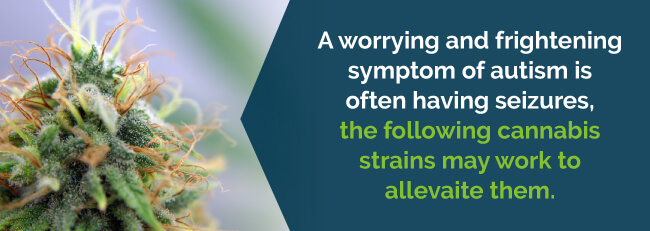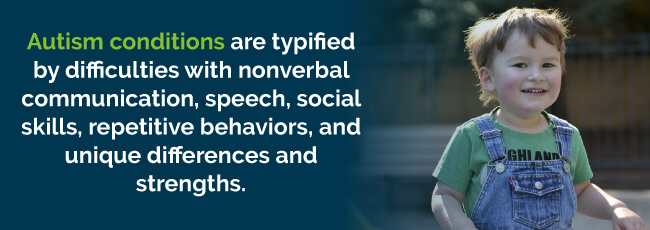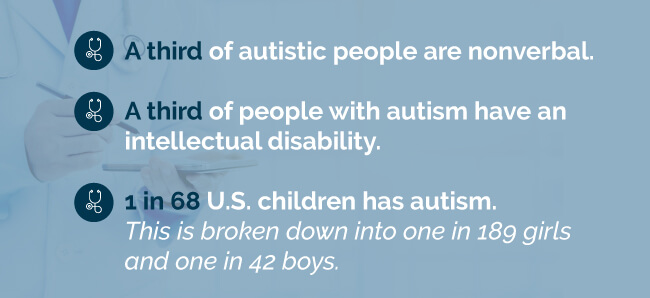Medical marijuana can help with disorders like autism or Asperger’s. Since these conditions can cause difficulties with social skills, nonverbal communication and repetitive behaviors, they can impact your quality of life. Cannabis can treat common symptoms of autism like anxiety and tics. Learn more about autism/Asperger’s, its symptoms and how medical marijuana can help.
A growing body of positive anecdotal evidence suggests taking cannabis for autism is an effective treatment. Researcher and clinical psychologist Dr. Giovanni Martinez is currently researching treating children with autistic spectrum disorder (ASD) with CBD (cannabidiol) oil.
In one case, a child who received a twice-daily dose of hemp oil spoke his first words after treatment. In just three weeks, he developed sign language skills after previously being non-verbal. The child in question was once so frustrated about being unable to communicate that he would self-injure. He can now express himself and is happily enjoying life.
Medical marijuana has been known to be a solution to alleviating outbursts of rage, seizures and temper tantrums among autism patients. Cannabis and cannabis-based products such as concentrates and tinctures can be responsible for the lessening of any erratic actions that may have occurred in the past.
Patients who use medical marijuana to treat their symptoms become extremely relaxed and very attentive to what they are doing. Best put, medical marijuana can serve as an exceptional behavioral modification, which can protect both the health and safety of an autistic patient.
Find A Doctor Find A Dispensary
Medical pot can be used to treat the seizures, communication problems, a tendency to self-harm, inability to sleep and potentially more. Many patients who receive marijuana daily see improvement in at least one of ASD’s core symptoms, including repetitive behaviors, social communication and language. In most of the cases, things like food acceptance, sensory difficulties, seizures and sleep and feeding disorders also improve.
To get medical cannabis for autism, you’ll first need a written recommendation from a physician, if your state has legalized the herb for your autism symptoms. Not all doctors will be willing to provide you with this recommendation, so you’ll want to find a qualified cannabis doctor.
Every state has its own laws about which conditions qualify for medical weed. You may even be required to obtain a medical marijuana ID card before you can begin treatment. Once you receive your written recommendation and ID card, you can then buy your cannabis at a dispensary.
You focus on health when you’re using cannabis medically. Therefore, you probably don’t want to smoke it. We all know the dangers of smoking, so what are the alternatives? You can take marijuana in various ways, including:
The above methods of using medical marijuana may be right for you if you’re focusing on your health. They eliminate smoke and enable you to try different ways of taking pot so you can find the perfect method for you.
There are many different strains of medical cannabis for autism available to purchase from dispensaries. Each has its unique effects. To find out what’s best suited to you, it’s a good idea to speak with a knowledgeable budtender or your medical marijuana doctor. Before you do that, you can take a look at this short list for background information.
A worrying and frightening symptom of autism is often having seizures. If these affect you and you don’t want to take conventional medications, the following cannabis strains may work for you:

When you’re on the autistic spectrum, it’s common to experience communication difficulties as well as an inability to relax. The following strains should offer some relief from these symptoms:
Cannabis is well known for its sedative qualities. There is probably nothing worse for your health than not sleeping. As you sleep, your body has the chance to repair itself. You recharge. If you have autism and are unable to sleep, the following heavy indica strains will do the trick:

Medical cannabis is worth a try if you feel conventional treatments are just not working for you or you need some additional help treating your symptoms.
Medical weed can significantly improve your autism symptoms. However, it’s important you know the potential side effects of the herb. While you could experience side effects when using cannabis, when compared with some prescriptions medications, the effects are typically mild and go away once your treatment wears off. Some potential side effects you could experience when using marijuana for autism are:
When compared with prescription medicines, medical pot treatment can have more benefits and fewer harmful side effects. As researchers conduct more studies on cannabis, more benefits of the herb may be found, thereby making it a more suitable treatment for individuals with autism or any other health condition.
Before starting your marijuana treatment, consult with your cannabis doctor to go over all the potential side effects.
Around one in 59 children in the U.S. has received a diagnosis of autism, according to the CDC.
Many parents of children with autism are advocating for medical cannabis to become legal for helping to treat some autism symptoms.
A parent advocacy group, Mothers Advocating Medical Marijuana for Autism (MAMMA), has a goal to provide all autistic children with legal access to medical cannabis under a doctor’s care. MAMMA’s website lists 10 family testimonials claiming cannabis has greatly helped their children’s autism symptoms.
Now that you know more about the benefits of medical cannabis for autism/Asperger’s for treating your symptoms and improving your quality of life, let’s explore more about autism to help you better manage your condition.
Autism is a disorder that relates to neural development. It is best characterized by impaired social interaction, restricted and repetitive behavior and lack of communication skills. The diagnostic criterion claims that symptoms become apparent within a child before they turn three years of age.
Autism directly affects the processing of information in the brain by altering nerve cells and their proper synapses. Asperger syndrome, commonly known as Asperger’s syndrome, is a disorder that lies within the autism spectrum and is best distinguished by significant difficulties in social interaction. Similar to autism in a way, this disorder also involved restricted and repetitive patterns of behavior.
Autism, also known as autistic spectrum disorder, refers to a range of conditions. The word “spectrum” relates to the broad array of challenges you experience when you have the condition. These are typified by difficulties with nonverbal communication, speech, social skills, repetitive behaviors and unique differences and strengths.

By the time a child is two or three years old, autism signs tend to become noticeable. Some diagnoses occur even earlier. Early evaluation and treatment improve your outcome.
In 2013, the American Psychiatric Association brought together four diagnoses into one umbrella term of autistic spectrum disorder. These conditions include:
Certain mental health and medical conditions may prevail alongside autism. These include:
There are a few types of autism:
There isn’t one clear cause of autism, however, it’s generally thought to be caused by brain function or structure abnormalities. Researchers are studying numerous theories, including links among genetics, heredity and medical problems.
There seems to be an autistic pattern or related disabilities in many families which further supports the theory the condition is genetic.
Some researchers are studying the potential for a cluster of unstable genes in certain conditions that could interfere with brain development, leading to autism. Others are researching problems in pregnant women or during delivery.
Then there’s the potential for environmental factors like metabolic imbalances, viral infections and exposure to chemicals.
Autism does tend to develop more often than expected in people with certain medical conditions like tuberous sclerosis, fragile X-syndrome, untreated phenylketonuria (PKU) and congenital rubella syndrome.
Project Autism provides a detailed look at the history, origin and timeline of autism. The word autism derives from the Greek word “autos,” meaning “self.” The condition was first described by Dr. John Langdon Down in 1887 as “developmental retardation.” In 1943, American Leo Kanner researched people with emotional and social limitations and withdrawn behavior. In 1944, Austrian doctor Johann “Hans” Friedrich Karl Asperger did similar research. Early names for the condition included Kanner’s syndrome and, later, Early Infantile Autism. Asperger later termed it Asperger syndrome.
According to Autism Speaks, autism can result in intellectual disabilities and is more prevalent in boys:

People with autistic spectrum disorders tend to engage in repetitive behaviors, have social interaction problems and encounter communication challenges. Symptoms and their severity widely vary as ASD is a spectrum disorder.
A core symptom of autism is a tendency to engage in a restricted range of activities and/or unusual repetitive behaviors. It’s common to:
You may be preoccupied with putting your household objects in a fixed order or in specific places. You might need your daily routine and environment to be incredibly consistent, without any changes. In the case of anything being different, you’ll feel extremely stressed and may be prone to outbursts.
You may develop all-encompassing obsessions and interests. You could have a huge interest in science, numbers, dates or symbols.
Developing babies are very social. In contrast, autistic children have social difficulties. At around eight to ten months, many babies with the condition won’t respond to their names, are disinterested in people and have delayed speech. By the time they’re toddlers, they’ll probably have trouble playing social games and will prefer to be on their own. They might not respond to parental displays of affection or anger.
An autistic person can’t pick up easily or quickly on social cues. They may be unable to see things from someone else’s perspective. They might be unable to understand other people’s feelings and to interpret gestures.
Frustration could lead to injury by engaging in:
When you have autism, you may consistently repeat what someone else has said or say the same words and phrases over and over. Mildly affected individuals may have huge vocabularies and enjoy carrying on monologues about their favorite subjects.
People with autism may be unable to understand expressions that aren’t designed to be taken literally. Being unable to comprehend the tone of voice and body language is a prevailing symptom.
If you think you might have ASD, experts encourage an early diagnosis for the best treatment outcome. You can reduce difficulties and focus on your strengths with proper care. There is no single best treatment as every autistic individual is different. Some methods of treatment include the following.
Your doctor may prescribe you medication to help with:
All medications come with the risk of side effects. For example, antipsychotic medications cause sedation and extreme lethargy. Perhaps this is why more people turn to natural methods like medical marijuana to treat their symptoms.
Intensive skill-oriented training sessions, such as sensory integration therapy, floor time, behavior modification and pivotal response training, can help you overcome difficulties. You may also be offered family therapy.
Many people are now turning to medical cannabis to manage their autism because it is very effective and doesn’t come with the harsh side effects that traditional medication causes.
If you or someone close to you is searching for a way to relieve the symptoms of autism, it’s time to take that next step. Search for a medical marijuana doctor or dispensary today to find out more about cannabis and autism. Take back control of your health and improve your quality of life.
Find A Doctor Find A Dispensary